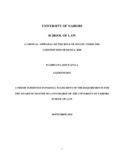| dc.contributor.author | Wambulwa, Job W | |
| dc.date.accessioned | 2017-01-11T12:32:10Z | |
| dc.date.available | 2017-01-11T12:32:10Z | |
| dc.date.issued | 2016 | |
| dc.identifier.uri | http://hdl.handle.net/11295/100343 | |
| dc.description.abstract | The 1963 Independence constitution of Kenya had established a bicameral legislature comprising of the Senate and House of Representatives. The role of the Senate was to protect the regions. However, due to deficiency of political will from the then government which favored unitary system of government, the Senate was abolished and merged with House of Representatives to form National Assembly in 1967. However, in 2010, the Constitution of Kenya reintroduced the Senate. Article 96 of the Constitution establishes the Senate and provides for its roles. The main justification of establishing the Senate was to represent and protect the interest of counties at national level. In 2013 through general elections the Senate was established comprising of the elected county representatives, nominated members of the Senate to represent special interests and the speaker. Kenyans were excited that the Senate would discharge their mandate and steer the fruits of devolution. However, since its establishment, there have been varied views on its effectiveness in representing and protecting the counties‟ interests. The Senate has been in conflict with the National Assembly and the County of Government over its functions. The supremacy battles between the Senate and the National Assembly is underpinned on the extent upon which the Senate exercises its legislative mandate on matters concerning counties. The Senate has accused the National Assembly of ignoring it legislative input in Bills concerning the county. At the same time the National Assembly accuses the Senate of usurping its powers in legislation. On the other hand, the Governors and members of County Assemblies (MCAs) have accused the Senate of usurping their powers in exercising its oversight role over national revenue allocated to the counties. These supremacy battles undermine the intended fruits of devolution.
xii
The conflicts amongst these organs have been attributed to the weak legal framework providing roles of the senate. The senate‟s oversight role is limited to national revenue allocated to the counties while the county assemblies play oversight over county executives over all fiscal matters. On the other hand, the senate is mandated to legislate on „matters concerning counties‟ while the national assembly plays a role in all legislative matters. This study appraises the legislative and oversight roles of the Senate and the extent of the effectiveness of those roles as provided for under the CoK | en_US |
| dc.language.iso | en | en_US |
| dc.publisher | University of Nairobi | en_US |
| dc.rights | Attribution-NonCommercial-NoDerivs 3.0 United States | * |
| dc.rights.uri | http://creativecommons.org/licenses/by-nc-nd/3.0/us/ | * |
| dc.subject | A Critical Appraisal Of The Role Of Senate Under The Constitution Of Kenya, 2010 | en_US |
| dc.title | A Critical Appraisal Of The Role Of Senate Under The Constitution Of Kenya, 2010 | en_US |
| dc.type | Thesis | en_US |



